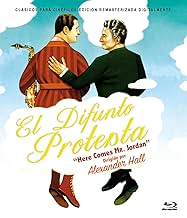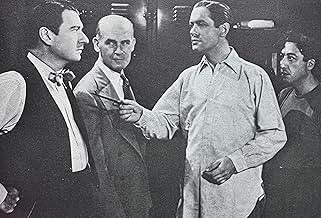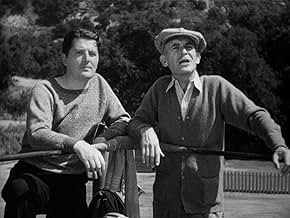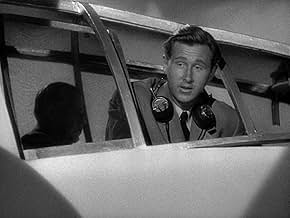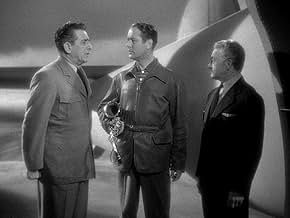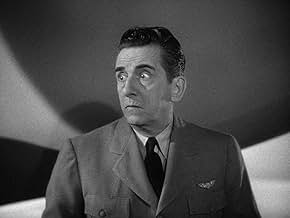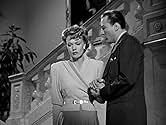IMDb RATING
7.5/10
7.8K
YOUR RATING
Boxer Joe Pendleton dies 50 years too soon due to a heavenly mistake and is given a new life as a millionaire playboy.Boxer Joe Pendleton dies 50 years too soon due to a heavenly mistake and is given a new life as a millionaire playboy.Boxer Joe Pendleton dies 50 years too soon due to a heavenly mistake and is given a new life as a millionaire playboy.
- Director
- Writers
- Stars
- Won 2 Oscars
- 8 wins & 6 nominations total
Warren Ashe
- Charlie
- (uncredited)
Carlyle Blackwell Jr.
- Boxing Match Spectator
- (uncredited)
Lloyd Bridges
- Sloan
- (uncredited)
Morgan Brown
- Man at Missing Persons Bureau
- (uncredited)
Eddie Bruce
- Reporter
- (uncredited)
James Carlisle
- Board Member
- (uncredited)
Ken Christy
- Chuck
- (uncredited)
- Director
- Writers
- All cast & crew
- Production, box office & more at IMDbPro
Featured reviews
"Here Comes Mr. Jordan" stars Robert Montgomery as Joe Pendleton, a prize fighter who, hurtling toward earth in his damaged plane, is taken to heaven prematurely by a new heavenly worker (Edward Everett Horton).
Upon reaching the gates, it appears that the book states that Joe isn't scheduled to head skyward until 1991. An attempt to return his spirit to his body fails since Joe was cremated; Joe ends up in the body of a business tycoon, Farnsworth, just drowned by his wife and male secretary, except Farnsworth is suddenly not dead.
Joe as Farnsworth meets Bette (Evelyn Keyes) and falls in love with her while wreaking havoc with the man's money and business and continuing to aggravate his wife and secretary. Then Mr. Jordan comes to him with some really bad news.
This is a delightful movie, and though "Heaven Can Wait," its '70s remake, was very enjoyable, how could it be as good or better when Claude Rains and Robert Montgomery are in the original?
Montgomery, who for years did light comedy as an elegant leading man, is wonderful as a streetwise prizefighter. James Gleason, as Joe's manager Corkle, has some great comic moments when he meets up with Farnsworth and Farnsworth claims to be the dead Joe.
Evelyn Keyes is lovely in the ingénue role, and Rita Johnson makes an excellent murderous wife. Claude Rains played the devil in another film, and as Mr. Jordan apparently works with the Head Honcho on the other side. He exudes warmth and calmness and performs beautifully opposite the more volatile Montgomery characters.
This film was released before Pearl Harbor, but everyone knew the U. S. would be entering the war. Thus began a spate of these films - "A Guy Named Joe," "Heaven Can Wait," "The Bishop's Wife," "Angel on my Shoulder," "It's a Wonderful Life," "Down to Earth," and others.
The fascination with death, angels, destiny, and souls was understandably rampant as reflected by Hollywood from 1941-1948 as people sought to understand what happened to their loved ones.
"Here Comes Mr. Jordan" is one of the really fine examples of this genre, with beautiful performances and story. I shed some tears at the end. Perhaps you will too.
Upon reaching the gates, it appears that the book states that Joe isn't scheduled to head skyward until 1991. An attempt to return his spirit to his body fails since Joe was cremated; Joe ends up in the body of a business tycoon, Farnsworth, just drowned by his wife and male secretary, except Farnsworth is suddenly not dead.
Joe as Farnsworth meets Bette (Evelyn Keyes) and falls in love with her while wreaking havoc with the man's money and business and continuing to aggravate his wife and secretary. Then Mr. Jordan comes to him with some really bad news.
This is a delightful movie, and though "Heaven Can Wait," its '70s remake, was very enjoyable, how could it be as good or better when Claude Rains and Robert Montgomery are in the original?
Montgomery, who for years did light comedy as an elegant leading man, is wonderful as a streetwise prizefighter. James Gleason, as Joe's manager Corkle, has some great comic moments when he meets up with Farnsworth and Farnsworth claims to be the dead Joe.
Evelyn Keyes is lovely in the ingénue role, and Rita Johnson makes an excellent murderous wife. Claude Rains played the devil in another film, and as Mr. Jordan apparently works with the Head Honcho on the other side. He exudes warmth and calmness and performs beautifully opposite the more volatile Montgomery characters.
This film was released before Pearl Harbor, but everyone knew the U. S. would be entering the war. Thus began a spate of these films - "A Guy Named Joe," "Heaven Can Wait," "The Bishop's Wife," "Angel on my Shoulder," "It's a Wonderful Life," "Down to Earth," and others.
The fascination with death, angels, destiny, and souls was understandably rampant as reflected by Hollywood from 1941-1948 as people sought to understand what happened to their loved ones.
"Here Comes Mr. Jordan" is one of the really fine examples of this genre, with beautiful performances and story. I shed some tears at the end. Perhaps you will too.
For his second of two Oscar nominations Robert Montgomery was loaned to Columbia Pictures for Here Comes Mr. Jordan, a very charming fantasy about a man who fulfills his destiny in many different ways in many different bodies.
I'm not sure how theologically sound this is, but apparently they make mistakes in heaven. Of course when you've got a new heavenly retriever on the job like Edward Everett Horton anything is possible.
He snatches prize fighter Robert Montgomery from a private plane that's about to crash. Only problem is that Montgomery wasn't supposed to die in the crash. What to do, send for Claude Rains in the title role as the heavenly fixer, Mr. Jordan.
Montgomery goes through two different bodies after that in an effort to give him the life span that the heavenly records are supposed to have for him. In one of those guises he meets Evelyn Keyes for whom he falls big time and she him. Of course there's a problem because Montgomery is a millionaire, married to Rita Johnson who with his private secretary, John Emery is trying to kill him.
Through all of this lending his confused elfin charm is James Gleason as Montgomery's fight manager. Seems as though Gleason had a destiny also, to manage a heavyweight champion. Gleason got his career role in Here Comes Mr. Jordan as he was nominated for a Best Supporting Actor, but lost to Donald Crisp for How Green Was My Valley. The film itself was Columbia's entry in the Best Picture category, but also lost to How Green Was My Valley.
This was Robert Montgomery's second Oscar nomination and the movie going public accepted him as good natured, saxophone playing pug Joe Pendleton a lot better than the homicidal maniac in Night Must Fall his first and other Oscar nomination. This time Montgomery lost to Gary Cooper in Sergeant York.
My favorite in this film however is the wise and patient Claude Rains as Mr. Jordan. One thing the film does do is that the end will have you wondering whether the whole thing really was Montgomery's destiny. Some of Rains's expressions will keep you guessing.
I'm not sure how theologically sound this is, but apparently they make mistakes in heaven. Of course when you've got a new heavenly retriever on the job like Edward Everett Horton anything is possible.
He snatches prize fighter Robert Montgomery from a private plane that's about to crash. Only problem is that Montgomery wasn't supposed to die in the crash. What to do, send for Claude Rains in the title role as the heavenly fixer, Mr. Jordan.
Montgomery goes through two different bodies after that in an effort to give him the life span that the heavenly records are supposed to have for him. In one of those guises he meets Evelyn Keyes for whom he falls big time and she him. Of course there's a problem because Montgomery is a millionaire, married to Rita Johnson who with his private secretary, John Emery is trying to kill him.
Through all of this lending his confused elfin charm is James Gleason as Montgomery's fight manager. Seems as though Gleason had a destiny also, to manage a heavyweight champion. Gleason got his career role in Here Comes Mr. Jordan as he was nominated for a Best Supporting Actor, but lost to Donald Crisp for How Green Was My Valley. The film itself was Columbia's entry in the Best Picture category, but also lost to How Green Was My Valley.
This was Robert Montgomery's second Oscar nomination and the movie going public accepted him as good natured, saxophone playing pug Joe Pendleton a lot better than the homicidal maniac in Night Must Fall his first and other Oscar nomination. This time Montgomery lost to Gary Cooper in Sergeant York.
My favorite in this film however is the wise and patient Claude Rains as Mr. Jordan. One thing the film does do is that the end will have you wondering whether the whole thing really was Montgomery's destiny. Some of Rains's expressions will keep you guessing.
This movie is my favorite film because of the comic and dramatic acting. Robert Montgomery is able to switch between Farnsworth and Joe Pendelton in a split second When he switches to Murdoch, you have a slight difference in speech and walk between Murdoch and Joe. The James Gleason scene in the gym with Montgomery is perfection. I love Claude Rains facial expressions and Edward Everett Horton's bumbling. The dectective's line (I believe he is William McBride, a great comic actor of the 1940's), "Where's the body" is one that I use as a joke with my husband often. The remakes of this film don't come close to the original. "Down to Earth", the one with Chris Rock, was just terrible. This plot has been borrowed often. It is the first film that every dealt with this subject and will remain a classic forever.
8dwtm
During a flight in a personal airplane, a young boxer by the name of Joe Pendleton crashes into a wooded area - just within the first ten minutes of the beginning of Here Comes Mr. Jordan. Unfortunately, a heavenly escort prematurely plucks his body from the plane before the actual crash, thereby rendering Joe body-less, yet technically alive. Joe's body is promptly cremated, so his new friend, Mr. Jordan, promises Joe a new form and they begin a search for a replacement. The 1941 film centers around Joe Pendleton, an affable man and a capable boxer, who is on his way to a fight whenever he meets his untimely death. With the help of Mr. Jordan, Joe attempts to reverse his misfortune with a new body and a fresh opportunity to enter the title fight. Along the way, however, he meets the unexpected: a beautiful, independent, and charmingly belligerent woman that he falls hopelessly in love with. The film centers around Joe's struggle to realize his dream of winning a title fight, however, it is truly a romantic comedy with themes that tend to focus on love and the fulfillment of our dreams. The makers of the film use Joe's different forms to impart their view that love is a connection between two people, while the body is simply a shell and love is a faceless awareness that sees through physical realities. Don't be turned off by this seemingly heavy theme, because Joe's constant wisecracks and frequent squabbles with the man who took him from his body keep the film light and enjoyable. Despite the occasional sluggish scene, this timeless film offers enough clean-cut comedy and bearable romanticism to warrant a viewing. It deals with an important subject without taking any importance away from keeping the film light and fun to watch.
Joe Pendleton dies prematurely when a heavenly messenger takes him before his time. This film examines how that messenger and his supervisor try and placate Mr. Pendleton with other bodies. This is a charming, fun, almost innocent film from a bygone era. Robert Montgomery is very good as the saxaphone-playing boxer who outwardly seems rough but inwardly has a heart of gold(okay, it gave me cliches too). The cast in this film excels. Montgomery is ably assisted by Claude Rains, James Gleason, Evelyn Keyes, and, my personal favourite, Edward Everett Horton. Rains plays the heavenly Mr. Jordan trying to fix Horton's heavenly blunder. Rains is as always very good, and his scenes in particular bring a warm glow to the screen. My favourite moments, however, are the scenes with rains and Horton talking "shop" and the ones with Horton and Montgomery bantering back and forth. Horton is a forgotten mine of comedic ability. Many reviewers seem obligated to make comparisons between this film and its most famous remake Heaven Can Wait. I like them both. Both films have qualities that exceed the other. Why we have to say one is better solely because it is older(or newer) is beyond me sometime.
Did you know
- TriviaColumbia chief Harry Cohn had serious misgivings about this adaptation of Harry Segall's minor stage play. He preferred to reserve his more lavish budgets for surefire successes (e.g., anything featuring the studio's biggest star, Rita Hayworth). However, Sidney Buchman eventually was able to talk Cohn into forking out for costly celestial sets and Farnsworth's elaborate mansion and also into hiring Robert Montgomery on loan-out from MGM. Buchman was also able to convince Cohn that he had a better appreciation of what the public would pay to see than the Wall Street bankers to whom Cohn answered.
- GoofsJust before Joe Pendleton and the messenger arrive at Joe's apartment, looking for his body, they pass a woman coming from the other direction. She moves her shoulder back and to the left to let Joe pass and also steals a quick glance at him. According to the messenger's comments just a moment later, neither he nor Joe can be seen or heard, so the woman should not have moved to let them pass or noticed them at all.
- Quotes
[last lines]
Mr. Jordan: So long, champ.
- ConnectionsFeatured in Sports on the Silver Screen (1997)
- SoundtracksThe Last Rose of Summer
(uncredited)
Traditional Irish melodies
[Played often on the saxophone by Joe Pendleton]
- How long is Here Comes Mr. Jordan?Powered by Alexa
Details
- Runtime
- 1h 34m(94 min)
- Color
- Aspect ratio
- 1.37 : 1
Contribute to this page
Suggest an edit or add missing content


